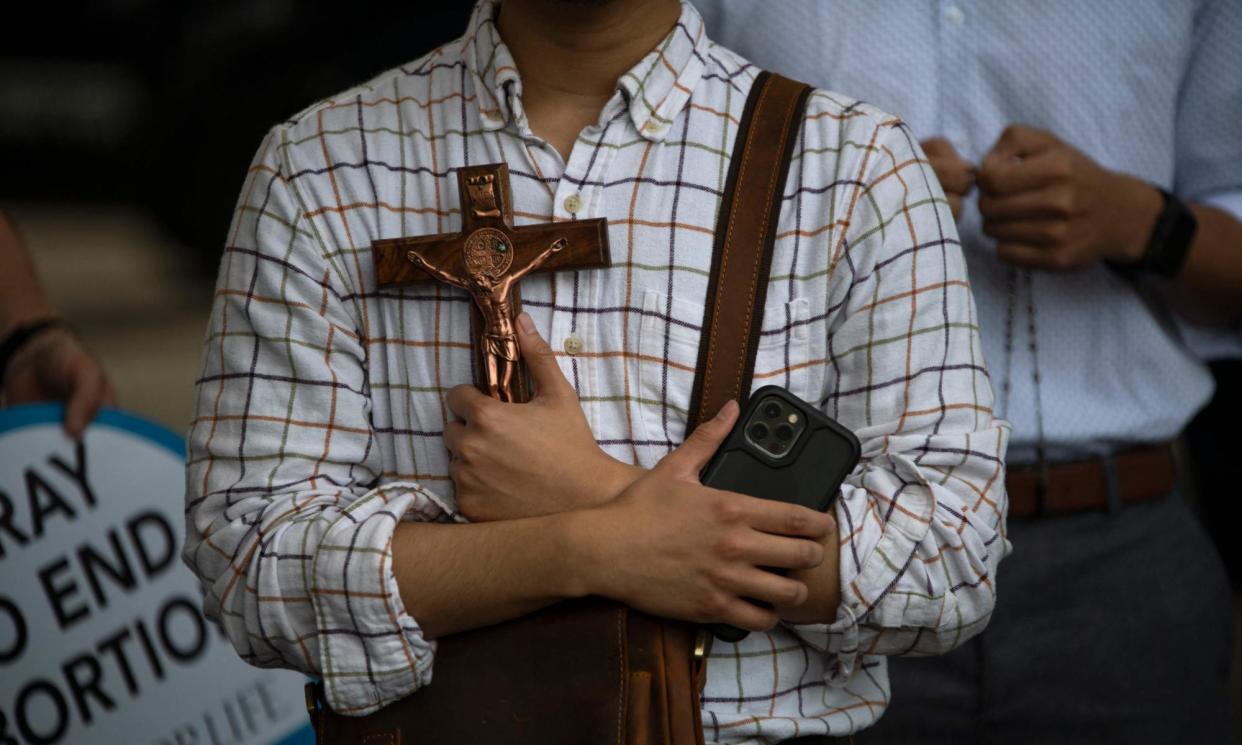Texas Republicans open to death penalty for abortion providers

Texas Republicans are open to applying the death penalty to abortion providers, a new proposal from the state party indicates.
Over the weekend, during the Texas GOP convention, Republican delegates voted on a party platform for 2024 that proclaims “abortion is not healthcare, it is homicide” and suggests striking a state law that protects abortion providers from being charged with homicide. In Texas, capital murder is punishable by the death penalty. Killing a child under the age of 15 can qualify as capital murder, the most severe form of homicide.
Related: Texas doctor who said nine-year-olds can safely give birth appointed to maternal mortality committee
Elsewhere in the platform, the Texas GOP calls for “legislation to abolish abortion by immediately securing the right to life and equal protection of the laws to all preborn children from the moment of fertilization”.
That language, as highlighted by the feminist writer Jessica Valenti, who first called attention to it earlier this week, draws from the rhetoric of “abortion abolitionists”, a fringe, hardline segment of the anti-abortion movement that has inched closer to the mainstream in recent years. While the mainstream anti-abortion movement typically supports exempting women seeking abortions from punishment, abortion abolitionists adhere to what they consider a more consistent line of logic: if a fetus is a person and abortion is murder, then abortion patients deserve to be punished like murderers.
Abortion patients are not mentioned in the provision in the proposed platform that redefines abortion as homicide, making its implications for abortion seekers unclear. Abortion bans typically target abortion providers for punishment, not patients.
Punishing women for abortions is a politically toxic stance, particularly as support for abortion rights has surged in the wake of the overturning of Roe v Wade. Even before Roe fell, Texas lawmakers repeatedly introduced bills that would have instituted the death penalty for abortion patients. They all stalled out in the Republican-dominated state legislature.
Regardless of the platform’s implications for abortion patients, adding language that in effect defines fetuses as people, complete with full legal rights and protections, could have vast implications for wide swaths of Texas law, including cutting off access to in vitro fertilization. Efforts to establish “fetal personhood” have sped up in anti-abortion circles in recent years, but experts say that the full implications of this ideology have never been realized. Earlier this year, IVF treatments in Alabama temporarily ground to a halt after the state supreme court ruled frozen embryos were “intrauterine children”.
As the home to one in 10 American women of reproductive age, Texas has long been a key laboratory for activists and lawmakers looking to fine-tune bills that restrict reproductive rights – many of which are exported to other state legislatures across the country.
In the 50-page platform, the Texas GOP also calls homosexuality an “abnormal lifestyle choice” and says providing gender-affirming care to minors is “child abuse”. The platform demands that the recent renaming of military bases be reversed in order to “publicly honor the southern heroes”, and confirms the platform supports “affirmation of God, including prayer, the Bible, and the Ten Commandments being returned to our schools, courthouses, and other government buildings”.
Although Republicans voted over the weekend on the proposed platform, the votes were set to be tallied this week. The Texas GOP did not immediately respond to a request for comment on whether the platform has been formally adopted or on its approach to abortion. The party platform is not a legislative slate; these proposals may never make their way into bills, much less pass.
The Texas state legislature, which meets only in odd-numbered years, will open for business in January 2025.

 Yahoo News
Yahoo News 
